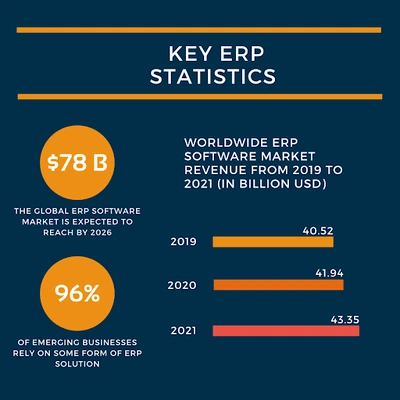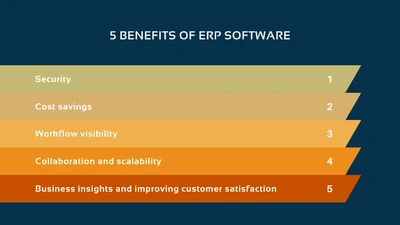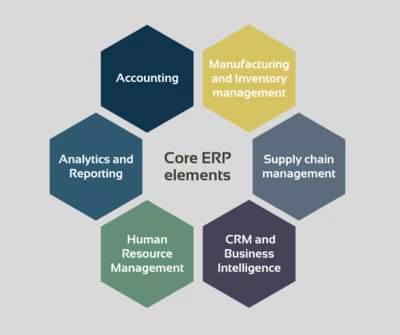Reliable solutions in ERP system development for complex business applications


Today, ERP software has become an indispensable tool for all-size businesses. According to the statistics, the ERP market is actively growing, with a total market size expected to exceed around $50 billion by 2024. 53% of IT decision-makers consider ERP an investment priority, in addition to CRM.

Put simply, the system works as a central database, which assists in business processes automatization. ERP collects inputs from various departments, such as manufacturing, accounting, customer communication, sales, supply chain, and human resources. As a result, employees don’t need to spend hours, searching for needed information or doing manual work. That kind of software is critical for unifying workers, processes, and techs across the company. But does each enterprise software work the same way? We will start our article by describing different types of ERP systems and current trends.
Although ERP refers to a category of business solutions, ERP systems can combine several modules for solving more complex tasks. For instance, products-based enterprises tend to use accounting, CRM (customer relationship management), inventory, and order management modules. If a company produces goods, then a manufacturing system is a must. A set of project management, professional services automation, accounting, and CRM is a perfect choice for the service business.
Let’s move on to systems’ key differences:
Nowadays, broader social integrations and customizable elements are integral parts of the system. More and more leading companies are moving to the cloud because of its flexibility and unlimited storage space. And of course, it’s hard to imagine a modern ERP without intelligent systems, augmented reality, IoT, and artificial intelligence. Statistics show that 65% of chief information officers will have integrated AI into their ERP systems by 2022. The tech has already received a lot of buzzes, and rightly so. Artificial intelligence is a robust solution for speech and image recognition, ride-sharing, and navigation apps. It’s time to take a deep dive into other up-to-date ERP advantages.


1. Accounting
The first element works to facilitate financial flow reporting and improving allocation security management.
2. Manufacturing
In addition to controlling the budget spent for the production process, the feature may concentrate on BOM (bill of materials) and product life cycle management.
3. Inventory management
It is designed to assist companies in managing the stock control requirements and clients’ data from a unified system. Plus, stock management is handy for planning asset rotation and avoiding extra spending.
4. Supply chain management
The feature tracks products while they go through the supply chain. SCM brings together apps for supply chain planning, warehouse and supplier management.
5. CRM
Business applications development includes building a customer relationship management system, aimed to enhance the company’s relationships with your clients and potential customers.
6. Business Intelligence
BI comprises all strategies and techs used by companies for the business data analysis, which is vital for the decision-making process.
7. Human Resource Management
If you want to administer HR business activities and launch strategic initiatives faster and more accurately, you know what to implement next.
8. Analytics and Reporting
As the subtitle implies, the last one contains inclusive reports from all company departments, which simplifies work with databases.

PNN Soft provides clients with high-quality web products. We have delivered more than 1000s stable projects for different industries, including dedicated enterprise resource system development. The company has 20 years of experience in creating highly efficient solutions, but we are continually honing our skills to deliver advanced technologies. Security is our primary concern when it comes to your digital transformation.
We are determined to seek innovative solutions that meet individual companies’ needs. That is why we know what technologies spell success for your business.
PNN Soft takes full advantage of RAD, Scrum, and Agile methodologies to ensure constant communication with customers and build a flexible manufacturing process. Our Agile-teams of professionals include software developers, testers, GUI designers, technical writers, and managers.
So if you are eager to develop an ERP software IT solutions for enterprises, fill in the form below.